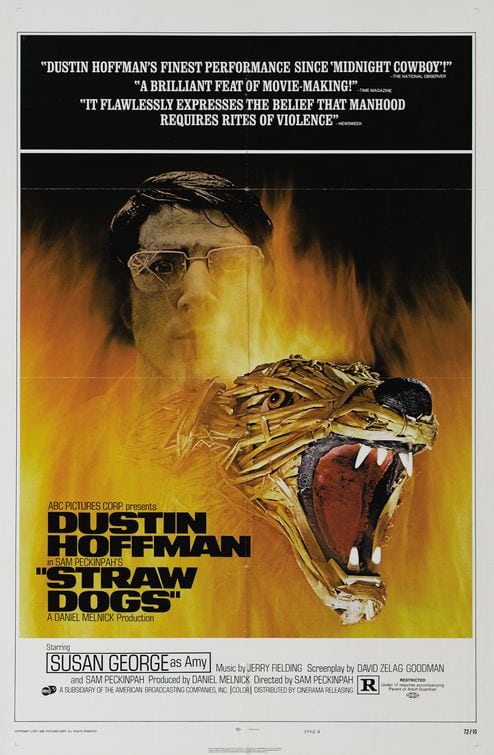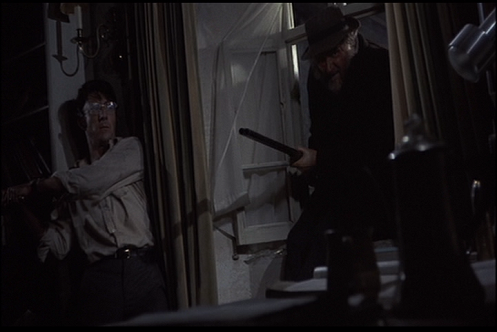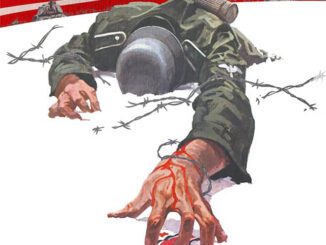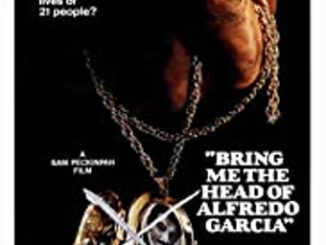Straw Dogs (1971)
Directed by: Sam Peckinpah
Written by: David Zelag Goodman, Gordon Williams, Sam Peckinpah
Starring: David Warner, Dustin Hoffman, Peter Vaughan, Susan George

HCF may be one of the newest voices on the web for all things Horror and Cult, and while our aim is to bring you our best opinion of all the new and strange that hits the market, we still can not forget about our old loves, the films that made us want to create the website to spread the word. So, now and again our official critics at the HCF headquarters have an urge to throw aside their new required copies of the week and dust down their old collection and bring them to the fore….our aim, to make sure that you may have not missed the films that should be stood proud in your collection. Here, Dr Lenera dissects one of the most controversial ‘mainstream’ movies ever made, a drama that you may not like, and may even be offended by, but you cannot ignore and really should see to make up your mind!
HCF REWIND NO.26. STRAW DOGS [1971]
AVAILABLE ON DVD AND BLU-RAY
DIRECTED BY:Sam Peckinpah
WRITTEN BY:Sam Peckinpah, David Zelag Goodman
STARRING:Dustin Hoffmann, Susan George, Peter Vaughn, Dale Henny
RUNNING TIME:118 mins
REVIEWED BY:Dr Lenera, Official HCF Critic
David Sumner, a timid American mathematician, leaves the chaos of the United States to live with his wife Amy in her hometown village of Wakely in Cornwall, where the expected peace and quiet would be perfect for him to do some work he has been given a grant to do. Immediately there is tension. Cracks in the relationship come to the fore, while David gets a frosty reception from most of the locals, especially Charlie Venner, who once went out with Amy and whom David has hired to fix the roof. Charlie still wants Amy, especially since their relationship was never consummated. Then David finds their cat dead, hanging in the closet, but refuses to confront Charlie and his companions. The following day, they invite David out hunting with them, perfect for Charlie to pay Amy a visit………..
 Given its reputation as an extremely violent film, Straw Dogs has the potential to maybe disappoint some modern viewers expecting reels of blood and gore. In fact, if you think about it, the violence in this slow-burning drama/thriller mainly just takes up a couple of minutes half way through and fifteen or so minutes at the end. However, the film’s power remains incredibly potent, and though you may not have seen as much brutality as you may have expected, you might be very shaken up and disturbed. It’s one of those films that doesn’t tell you what to think. Instead, it leaves you to make up your mind. Watching it again yesterday, I was still stunned by what a fine piece of work it is; brilliantly paced, minutely detailed, and entirely convincing, yet also felt a little grubby and uneasy, which I have no doubt director Sam Peckinpah intended! The movie contains an extremely controversial rape scene which still has the power to offend, but seems to me to be more of case of raising thorny issues than simply being offensive. More on that later.
Given its reputation as an extremely violent film, Straw Dogs has the potential to maybe disappoint some modern viewers expecting reels of blood and gore. In fact, if you think about it, the violence in this slow-burning drama/thriller mainly just takes up a couple of minutes half way through and fifteen or so minutes at the end. However, the film’s power remains incredibly potent, and though you may not have seen as much brutality as you may have expected, you might be very shaken up and disturbed. It’s one of those films that doesn’t tell you what to think. Instead, it leaves you to make up your mind. Watching it again yesterday, I was still stunned by what a fine piece of work it is; brilliantly paced, minutely detailed, and entirely convincing, yet also felt a little grubby and uneasy, which I have no doubt director Sam Peckinpah intended! The movie contains an extremely controversial rape scene which still has the power to offend, but seems to me to be more of case of raising thorny issues than simply being offensive. More on that later.
Peckinpah’s and David Zelag Goodman’s screenplay was based on the 1969 novel The Siege Of Trencher’s Farm by Gordon Williams. He altered the book greatly, so much so that Williams publically expressed dislike for the adaptation. Amongst many other things, he removed the character of David and Amy’s daughter, added the rape, and changed some of the characters i.e. the handicapped girl Janice Hedden became a Lolita-esque tease. Donald Sutherland, Sidney Poitier and Jack Nicholson were amongst those who were considered from the role of David, and though Dustin Hoffmann ended up with it, he was not entirely comfortable with the part and later on said he only took it for the money. The list of actresses considered for Amy, eventually played by Susan George, included Jacqueline Bisset, Hayley Mills [which I think would have worked almost as well], Helen Mirren and Charlotte Rampling. George almost walked off the project until Peckinpah, who was drinking heavily throughout much of the shooting, agreed to shoot the rape less graphically. Upon release, in a pretty violent year for movies including A Clockwork Orange and Dirty Harry, not to mention having the previous two years offer films like The Wild Bunch and Soldier Blue, it became almost the centre point in debates about increasing screen brutality, though many critics did recognise the film’s quality. It did fairly good box office business, and now has a remake, about which I’ve heard bad things, but I shall say no more about that until I’ve seen it!
Straw Dogs is certainly a slow-burner, taking its time to set up its situations, but the screenplay is actually quite dense, with every little scene containing something of importance. Take for instance the many scenes between David and Amy in their house, which reveal more and more problems in their marriage which were probably evident before but are making themselves more obvious now in this different setting. It seems that David is a bit sexist and just wants his wife to cook and sleep with him, while Amy wants things more balanced. In fact David is a condescending, aloof person to virtually everyone he encounters in the film, and his behaviour rarely helps matters and perhaps even provokes them. He considers himself a pacifist, but one of the main themes of the film is Peckinpah’s belief that deep down we are all primitive, territorial animals, and it soon becomes evident that even David has the potential to be like this. The key scene in this respect is during the hunt, where he has been left on his own, you see him sitting alone with his rifle, almost surveying his kingdom and you can see feeling the power he perhaps has.
After Amy is raped, the film still builds and builds, the mounting tension simply brilliant, until an accidental murder occurs and the killer is given shelter by David. The climax, of David defending his house against some of the vengeful villagers, remains shattering stuff. The violence here, from garrotting to feet being blown apart to the use of a bear trap, is still strong stuff but more remarkable are the sheer intensity of the sequence and the seeming calmness of David. Seeing him fight back is at first a bit rousing, in the way scenes like this can often be, but even a little cool, but soon we are made to feel somewhat disturbed by the easiness and casualness with which he is able to dispatch his opponents, and by the end we don’t feel very good about it at all. There are few stronger statements in cinema about the psychological damage of violence than David saying, in response to Henry’s comment that he doesn’t know the way home, “neither do I”, and we are left with a profoundly disturbing image of a person on the brink of sanity, who is truly lost in hell and may never get out.
 Many will say though that it’s the film’s rape scene that is most disturbing, and many still find it inexcusable in what it supposedly implies. It doesn’t help that Amy is a bit of a tease to some of the villagers including walking around naked in her house knowing she can be seen. Charlie starts to assault Amy, but after initial attempts to fight him off, she appears to enjoy it. Now, considering that I personally once knew someone who was horribly raped, I agree that the idea that a woman can enjoy being raped is abhorrent, but it seems to me that Amy is faking the enjoyment to take away some of the horror of what she is experiencing, something that in my opinion is almost made obvious by quick shots of David from Amy’s point of view, indicating that she’s half-imagining it’s David so she can get through it. This scene is than followed by a much more unambiguous buggery assault from another, the ugliness of which [despite not actually being very graphic] we are left in no doubt of. Later on, Amy is at a part with David, and as she looks around the room at various people having fun we are flashed images of the rape, more than half of them being from the first attack. To me, this tells us that both attacks have really scarred Amy, and actually is a really sad and powerful moment, because Amy is surrounded by people, and yet can tell no one of her ordeal. In fact, in a particularly disturbing touch, she never tells David at all, and what’s the betting that his response would not have been one of compassion or comfort?
Many will say though that it’s the film’s rape scene that is most disturbing, and many still find it inexcusable in what it supposedly implies. It doesn’t help that Amy is a bit of a tease to some of the villagers including walking around naked in her house knowing she can be seen. Charlie starts to assault Amy, but after initial attempts to fight him off, she appears to enjoy it. Now, considering that I personally once knew someone who was horribly raped, I agree that the idea that a woman can enjoy being raped is abhorrent, but it seems to me that Amy is faking the enjoyment to take away some of the horror of what she is experiencing, something that in my opinion is almost made obvious by quick shots of David from Amy’s point of view, indicating that she’s half-imagining it’s David so she can get through it. This scene is than followed by a much more unambiguous buggery assault from another, the ugliness of which [despite not actually being very graphic] we are left in no doubt of. Later on, Amy is at a part with David, and as she looks around the room at various people having fun we are flashed images of the rape, more than half of them being from the first attack. To me, this tells us that both attacks have really scarred Amy, and actually is a really sad and powerful moment, because Amy is surrounded by people, and yet can tell no one of her ordeal. In fact, in a particularly disturbing touch, she never tells David at all, and what’s the betting that his response would not have been one of compassion or comfort?
Unsurprisingly, the rape scene has often been cut, most notable in the US, where the second assault was almost entirely removed, actually making the ramifications of the first attack worse, because there was less to contrast it with. Amazingly though, the UK cinema release was uncut [though two shots were removed from the initial print which are now lost], but the later video version was the US cut. It was this version that was unsuccessfully submitted several times to the BBFC, who eventually passed the full version. I personally don’t feel the scene or the film is offensive, but I’m not going to criticise those who do take offence, because I did the first time I saw Straw Dogs. A couple of years later, I think I understood what Peckinpah intended. I will say, though, that the Of Mice And Men- influenced subplot of the possibly dangerous Henry Niles and Janice the ill-fated tease seems a bit forced, and possibly the villains become a bit cartoonish, but we all know how horrid people can get when filled with drink and riled up!
The direction and editing, some of which was by Roger Spottiswoode who later became a director himself, is absolutely first class. Almost subliminal flashes alternate with bits of slow motion [though this is used less often than usual for Peckinpah]. Quick, cut to the bone scenes alternate with lengthy sequences full of detail and richness. Importantly, none of this really jars, and all helps the story along at a slow but steady speed. Hoffman may have had misgivings about his role, but if anything his discomfort helps his performance, which is actually quite restrained, but suggests infinite things spinning round in his head, and he becomes really chilling. When he’s fighting off the villagers, he’s scary. Susan George’s character is less well written, but she does a superb job, especially after she has been raped, where she shows Amy’s terrible pain and trauma with just a few certain looks. I should also mention Jerry Fielding’s atonal, almost experimental score, miles away from traditional film music but perfect to this particular film, where ‘nice memorable tunes’ would have felt out of place. Straw Dogs is a tremendous movie, raw, uncompromising and possibly dangerous. For better or worse, it shows an artist expressing himself totally without restraint, and even if you dislike the film or some of the things in it, you cannot deny that the cinema would be a more exciting place if more filmmakers were allowed to do that today.
[pt-filmtitle]Straw Dogs[/pt-filmtitle]






Great review, doc. I agree that the power and shocking nature of Straw Dogs is still there having watched the movie quite recently. Never has the primal sound of the bagpipes been used to better effect. I am still left with a sense of unease when the credits finally roll.